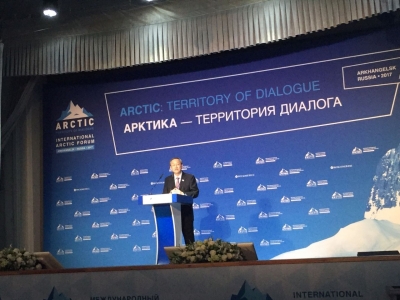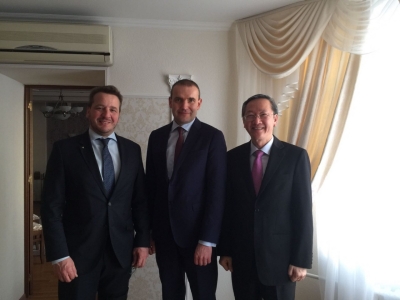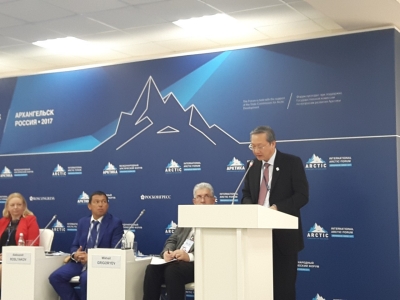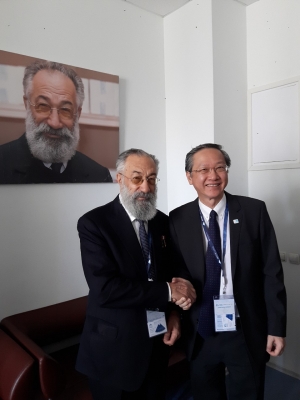Minister of State in the Prime Minister’s Office and Ministry of Manpower Sam Tan, who is in Arkhangelsk, Russia, for the 4th International Arctic Forum delivered remarks at the opening session of the Forum and in the plenary session, “The Arctic: Territory of Transport Opportunities” on 29 March 2017. At the opening of the forum, MOS Tan stressed the importance of the sustainable development of the Arctic and shared Singapore’s Arctic engagement, including the hosting of several important seminars and workshops on the Arctic. MOS Tan’s opening remarks were well received with several POHs from Arctic nations congratulating MOS Tan. At the subsequent “The Arctic: Territory of Transport Opportunities” plenary session, MOS Tan spoke about the transport opportunities of the Arctic and the relevance of Singapore’s experience in maritime affairs to the Arctic. The text of MOS Tan’s remarks are appended.
MOS Tan also met with the President of the Republic of Iceland Dr Guðni Thorlacius Jóhannesson. They reaffirmed the strong cooperation on Arctic affairs between Singapore and Iceland and exchanged views on the future of the Arctic region and its global implications.
MOS Tan also met with Russian Special Representative of the President on International Cooperation in the Arctic and Antarctic Artur Chilingarov on 30 March 2017. Chilingarov noted Singapore’s active participation on Arctic affairs and was appreciative of Singapore’s continued Arctic engagement efforts.
MOS Tan will depart for Singapore on 31 March 2017.
. . . . .
MINISTRY OF FOREIGN AFFAIRS
SINGAPORE
30 MARCH 2017




OPENING REMARKS BY MINISTER OF STATE IN THE PRIME MINISTER’S OFFICE AND MINISTRY OF MANPOWER SAM TAN CHIN SIONG AT THE 4TH INTERNATIONAL ARCTIC FORUM “THE ARCTIC: TERRITORY OF DIALOGUE”, 29 MARCH 2017 AT 10.30 AM, LOMONOSOV NORTHERN ARCTIC (ARCTIC) FEDERAL UNIVERSITY ASSEMBLY HALL
Deputy Prime Minister Dmitry Rogozin,
Excellencies,
Distinguished speakers,
Ladies and Gentlemen,
1 Good morning. I would like to firstly thank Deputy Prime Minister Rogozin and the Organising Committee for inviting Singapore to speak today at the opening of this 4th International Arctic Forum. It is most fitting that we are meeting here in the historic city of Arkhangelsk (Ark-hung-girl), the largest city in the Russian Arctic and also the starting point of Russian polar exploration. Even though Singapore is more than 8600 km from Arkhangelsk, we decided to come here today as this forum discusses topics that are relevant to Singapore and to the Southeast Asian region where Singapore is located. Melting polar ice-caps pose a threat not just to the immediate surrounding region, but to low lying islands such as Singapore. As a small maritime nation situated at one of the most important shipping lanes in the world, Singapore is also interested in the possibilities and opportunities that the opening of the Northern Sea Route presents for international shipping.
2 Last year, I had the privilege to sail on the world’s largest Russian nuclear-powered icebreaker “50 Years of Victory” from Anadyr to Pevek. In fact, as my dear friend Artur Chilingarov had speculated, I could be the very first Singaporean to have travelled a section of the Northern Sea Route. It allowed me to witness first-hand, the rapid development and the opportunities in the Russian Arctic. Later this afternoon, I will be speaking on possible collaborations between Singapore and Russia in the areas of transport and shipping.
3 The main theme of this forum, “People and the Arctic”, recognises the special and intimate relationship between the Arctic peoples have with the region. We believe that the indigenous peoples are instrumental to the sustainable development of the Arctic. We have, therefore, established the Singapore-Arctic Council Permanent Participants Cooperation Package, which includes study visits to Singapore and offering of technical training courses for indigenous peoples. We also offer postgraduate scholarships to the indigenous peoples for select Master’s programmes at Singapore Universities. In fact, the very first postgraduate scholarship was offered to a member of RAIPON.
Ladies and Gentleman,
4 As mentioned by my Icelandic colleague, whatever happens in the Arctic, does not stay in the Arctic and similarly, whatever happens outside affects the Arctic as well. To raise awareness of the Arctic and its challenges, Singapore has hosted series of seminars to bring the conversation on the Arctic to the Southeast Asia region. In January this year, Singapore, with the support of the Norwegian Embassy, hosted more than 80 participants from 20 different countries to the very first Arctic Council-organised Arctic Migratory Bird Initiative Workshop (AMBI) in Singapore. Most are not aware, but Singapore and Russia are in fact connected through the East-Asian Australasian Flyway. Singapore enjoys annual visits from more than 2,000 Arctic migratory birds, with some coming from as far as Siberia as well. In August 2016, the National University of Singapore (NUS) Energy Studies Institute (ESI) also organised the “Energy Transitions and a Globalised Arctic” Seminar. The conference examined issues such as access to energy in remote locations and the governance of sustainable energy transitions. These topics are also relevant to the energy issues in the Arctic region for the Arctic people.
5 Although Singapore’s own Arctic journey has only just begun, we look forward to the adventure ahead and stand ready to contribute to the sustainable development of the Arctic region where we can within our means. I look forward to the discussions ahead and wish you all a fruitful and enjoyable stay in Arkhangelsk. Thank you.
. . . . .
REMARKS BY MINISTER OF STATE IN THE PRIME MINISTER’S OFFICE AND MINISTRY OF MANPOWER SAM TAN CHIN SIONG AT THE 4th INTERNATIONAL ARCTIC FORUM “ARCTIC: TERRITORY OF DIALOGUE”, “THE ARCTIC: TERRITORY OF TRANSPORT OPPORTUNITIES” PLENARY SESSION, WEDNESDAY, 29 MARCH 2017 AT 1.30 PM, LOMONOSOV NORTHERN ARCTIC (ARCTIC) FEDERAL UNIVERSITY HALL 6
Excellencies,
Distinguished speakers,
Ladies and Gentlemen,
1 Good afternoon. While far from the Arctic, Singapore follows developments in the region closely because of the risks and opportunities that changes imply for us. As the result of rising temperatures, transarctic shipping lanes, especially the Northern Sea Route (NSR), could potentially provide shorter alternatives between Europe and Asia and Europe and America compared to conventional routes, should they become commercially viable.
2 Singapore is a maritime nation. The sector contributes to 7% of our Gross Domestic Product. We are therefore naturally interested in the opening of sea routes in the Arctic and the impact it will have on Singapore. However, these routes also offer new economic opportunities and possibilities. Over the years, our marine industry has built up strong credentials in sectors including shipbuilding and repair, offshore engineering, and marine support services.
3 In addition to being the first Asian shipyard to build icebreakers, Singapore’s Keppel Group has developed and refurbished offshore rigs to operate in Arctic conditions, and is currently working with a US oil major on the very first “green rig” to be used in the Arctic. Other Singapore companies with competencies to construct ice-class vessels, such as ST Marine, are looking to tap into the Arctic market. Singapore’s expertise in port building and management has also opened up opportunities for cooperation in Arctic development, with PSA International Pte Ltd expressing a strong interest in exploring investment opportunities in the Arctic.
4 However, even as it offers an abundance of opportunities, the increasing use of the Arctic for transportation may pose hazards to the fragility of its unique marine environment, should accidents occur. As a major flag state with a sizeable ship registry, Singapore believes in the importance of a strong, robust international legal framework that can ensure navigational safety and environmental protection in relation to shipping activities in polar waters. We have participated actively in the discussions on the development and formulation of the Polar Code at the International Maritime Organisation, and welcome its adoption by the IMO and its entry into force this year. The agreement on the Cooperation on Marine Oil Pollution Preparedness and Response, signed by the the Arctic Council Member States in 2013, is another example of how international dialogue and consultation have contributed to the formulation of a truly comprehensive framework for responsible and sustainable management of the Arctic.
Ladies and Gentlemen,
5 I hope that sharing Singapore’s perspective has brought to your attention how the Arctic matters as a territory of transport opportunities not just for the region, but the rest of the world. At the same time, it has become clear that the sustainable development of Arctic transportation requires a coordinated approach and careful management by all stakeholders, including both Arctic littoral states and user states. In this regard, this conference is aptly titled “Arctic: Territory of Dialogue”. Thank you.
. . . . .